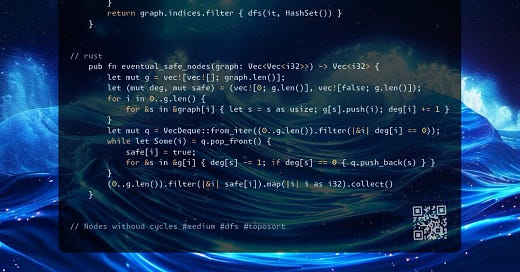24.01.2025
802. Find Eventual Safe States medium blog post substack youtube
Join me on Telegram
Problem TLDR
Nodes without cycles #medium #dfs #toposort
Intuition
The problem description was misleading. The actual task is to filter out cycles.
Simple DFS with memoization works.
Why does Topological Sort work? Example:
// [2, 2] [0] [3] [] <-- not valid input, [2,2],
// graph [i] must be strictly increasing
// [1] [0] [3] []
// 0 -> 1
// 1 -> 0
// 2 -> 3
// 3 -> . reverse: 3 -> [2], 2 -> [], 1 -> [0], 0 -> [1]
// 0 1 2 3
// deg: 1 1 1 0
// take 3->[2]
// deg: 1 1 0 0
// take 2->[] end
As we can see,
in-degrees for cycles are always > 0.
Approach
let's implement both DFS and Toposort.
Complexity
Time complexity: $$O(EV)$$
Space complexity: $$O(E + V)$$
Code
fun eventualSafeNodes(graph: Array<IntArray>): List<Int> {
val safe = HashMap<Int, Boolean>()
fun dfs(i: Int, vis: HashSet<Int>): Boolean = safe.getOrPut(i) {
vis.add(i) && graph[i].all { dfs(it, vis) }
}
return graph.indices.filter { dfs(it, HashSet()) }
}
pub fn eventual_safe_nodes(graph: Vec<Vec<i32>>) -> Vec<i32> {
let mut g = vec![vec![]; graph.len()];
let (mut deg, mut safe) = (vec![0; g.len()], vec![false; g.len()]);
for i in 0..g.len() {
for &s in &graph[i] { let s = s as usize; g[s].push(i); deg[i] += 1 }
}
let mut q = VecDeque::from_iter((0..g.len()).filter(|&i| deg[i] == 0));
while let Some(i) = q.pop_front() {
safe[i] = true;
for &s in &g[i] { deg[s] -= 1; if deg[s] == 0 { q.push_back(s) } }
}
(0..g.len()).filter(|&i| safe[i]).map(|i| i as i32).collect()
}
vector<int> eventualSafeNodes(vector<vector<int>>& g) {
vector<int> s(size(g)), r;
function<bool(int)> dfs = [&](int i) {
if (s[i]) return s[i] == 2; s[i] = 1;
for (int j: g[i]) if (!dfs(j)) return false;
s[i] = 2; return true;
};
for (int i = 0; i < size(g); ++i) if (dfs(i)) r.push_back(i);
return r;
}



